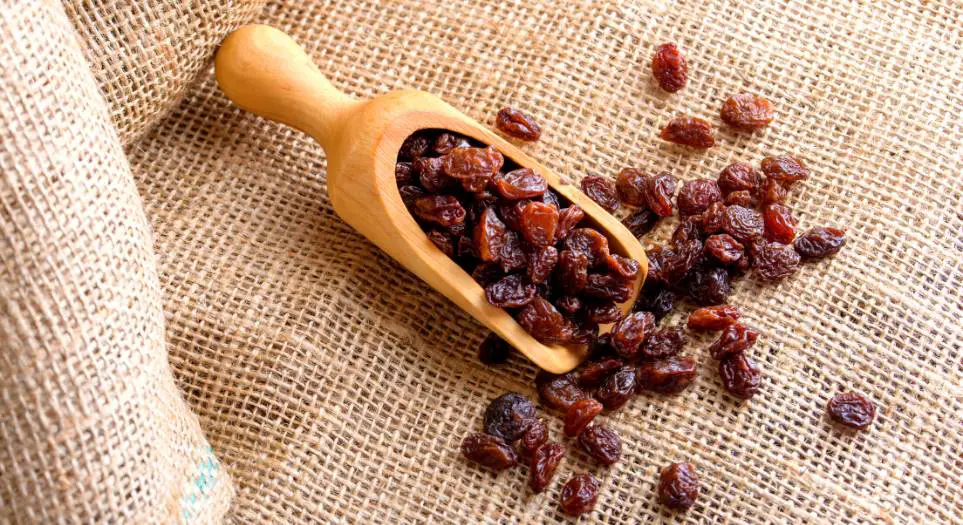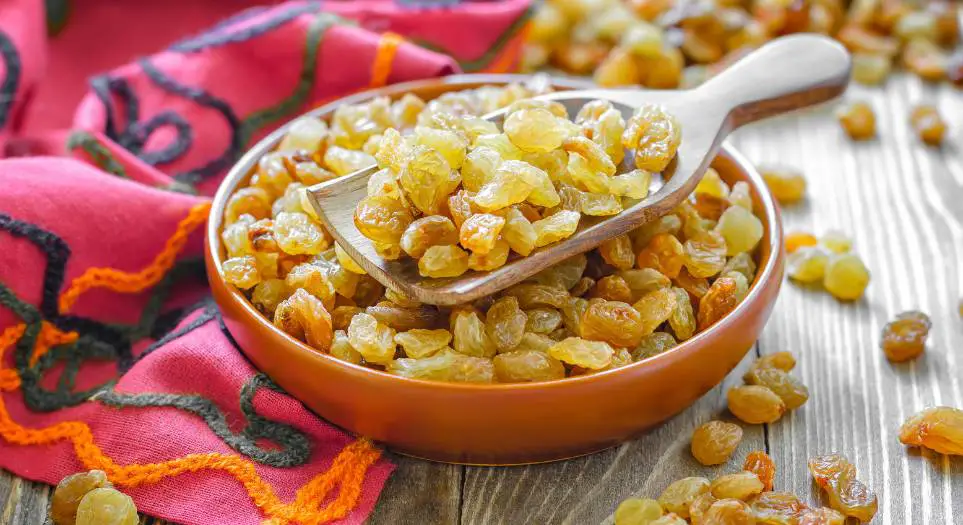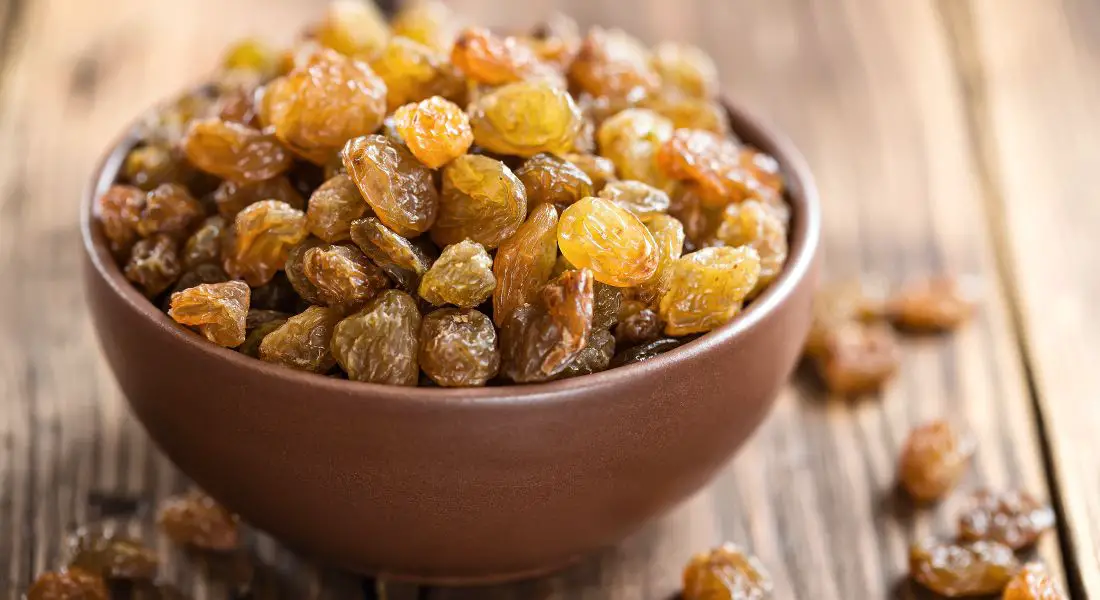Are raisins high histamine? Raisins are not a significant source of histamine naturally. However, there are some things you should know about raisins before eating them. If you have histamine intolerance, the more knowledge you have about the histamine content of the foods you eat, the better. Histamine is a type of biogenic amine, but there are others, including tyramine and phenylethylamine. (6)
Histamine and other biogenic amines are in many foods that cause problems for people with histamine intolerance, including fermented foods and beverages, some seafood, and some fruits and vegetables. (1) Just as histamine can cause histamine intolerance symptoms, such as headache, diarrhea, nausea, and a drop in blood pressure, other biogenic amines can also be problematic in those who are sensitive to them or have problems breaking them down.
If you enjoy raisins as a snack or in recipes, you might wonder whether they’re likely to worsen your histamine intolerance symptoms. Let’s take a closer look at what science says about this.
What Are Raisins?
Raisins are dried grapes made by drying grapes, either in the sun or in drying machines, until the moisture content is reduced to about 15%. Raisins come in different types, including Thompson seedless, Muscat, and Sultana, a white oval, seedless grape.
Grapes are typically small, wrinkled, and sweet, and are often used in baking and cooking to add sweetness, texture, and flavor. Raisins are a good source of fiber and antioxidants and also contain a variety of vitamins and minerals. Since raisins are dried grapes, you would expect raisins to be high in histamine if grapes are. Fortunately, grapes are not high in histamine either.
Raisins come in black, golden-yellow, and white varieties. Although you might have a preference taste-wise, they’re similar nutritionally. Both yellow and black grapes are dried Thompson seedless grapes, although the drying process differs.

Beyond Histamine: The Health and Nutritional Benefits of Raisins
Although raisins are high in natural sugar, they also contain fiber that helps reduce the rise in blood sugar you get when you munch on raisins. A half cup contains almost 3.5 grams of fiber. Because of the fiber they contain, snacking on a handful of raisins is a healthier alternative to other sweet treats.
Raisins are also a surprisingly good source of antioxidants. A study looked at the antioxidant content of Green Thompson seedless grapes, the most widely consumed type of grape in the United States. (2) Antioxidants are scavengers of free radicals, rogue molecules that damage cells and tissues.
Antioxidants from sources such as raisins neutralize them, so they’re less able to cause damage. We’re exposed to free radicals naturally during metabolic processes, but environmental sources such as air pollution and cigarette smoke also trigger their production.
This study found that both grapes and raisins are packed with phenolic antioxidants, which could be beneficial to health. (2) For example, antioxidants help subdue inflammation, which can also cause histamine release. That’s why it’s important to eat an anti-inflammatory diet. Raisins can be part of that.
Raisins also contain a variety of minerals, including iron, potassium, and calcium, which are important for health. They’re also a natural source of energy, as they contain simple sugars such as glucose and fructose. One study found raisins were as effective as sports jellybeans for boosting exercise performance for moderate to high-intensity exercise. (3) So, the raisin has some hidden superpowers!

Raisins Could Trigger Histamine Release if You’re Allergic to Them
Some people may experience histamine issues when they eat raisins because they’re allergic to them. Allergic reactions trigger histamine release. However, raisins themselves do not naturally contain significant histamine or other biogenic amines. People allergic to raisins experience an immune response to certain proteins in raisins, and that causes histamine release from mast cells. If you experience an allergic reaction to raisins, it is important to see a doctor or allergist for proper diagnosis and treatment. They can determine the cause of your reaction and recommend the best course of action.
Raisins contain high levels of salicylates, a natural phenolic compound found in many plants and may contain up to 10 times more salicylates than other fruits. Dried fruit, in general, are high in salicylates due to the removal of water during drying. If you’re sensitive to salicylates, avoid raisins and other dried fruit. (7)
Are Raisins High Histamine?
Raisins are not naturally high in histamine or other biogenic amines. Nor are they known to be histamine liberators in absence of an allergy to raisins or sensitive to other components in raisins, like salicylates. So, they’re unlikely to increase your body’s histamine burden if you’re not allergic to them or sensitive to salicylates. But as you know, every person with histamine intolerance is a little different.
Whether you get symptoms depends on much diamine oxidase you must break down histamine and the totality of your diet. You could also have other allergies or food sensitivities. That’s why it’s important to keep a journal of what you eat and the symptoms you have in response to various foods.
The ultimate determiner of whether you can eat raisins, or any other foods, is how you feel when you eat them. Always introduce a new food slowly to your diet, and monitor your symptoms before eating large quantities. Even though they’re low in histamine, it’s still smart to do this with raisins too.
References:
- Comas-Basté O, Sánchez-Pérez S, Veciana-Nogués MT, Latorre-Moratalla M, Vidal-Carou MDC. Histamine Intolerance: The Current State of the Art. Biomolecules. 2020 Aug 14;10(8):1181. doi: 10.3390/biom10081181. PMID: 32824107; PMCID: PMC7463562. https://pubmed.ncbi.nlm.nih.gov/32824107/
- Parker TL, Wang XH, Pazmiño J, Engeseth NJ. Antioxidant capacity and phenolic content of grapes, sun-dried raisins, and golden raisins and their effect on ex vivo serum antioxidant capacity. J Agric Food Chem. 2007 Oct 17;55(21):8472-7. doi: 10.1021/jf071468p. Epub 2007 Sep 20. PMID: 17880162.
- Rietschier HL, Henagan TM, Earnest CP, Baker BL, Cortez CC, Stewart LK. Sun-dried raisins are a cost-effective alternative to Sports Jelly Beans in prolonged cycling. J Strength Cond Res. 2011 Nov;25(11):3150-6. doi: 10.1519/JSC.0b013e31820f5089. PMID: 21881533; PMCID: PMC7081390.
- Pastrana-Bonilla E, Akoh CC, Sellappan S, Krewer G. Phenolic content and antioxidant capacity of muscadine grapes. J Agric Food Chem. 2003 Aug 27;51(18):5497-503. doi: 10.1021/jf030113c. PMID: 12926904. https://pubmed.ncbi.nlm.nih.gov/12926904/
- Cafasso J. Are Raisins Good for You? Healthline. Published May 3, 2016. Accessed January 8, 2023. https://www.healthline.com/health/food-nutrition/are-raisins-good-for-you
- Doeun D, Davaatseren M, Chung MS. Biogenic amines in foods. Food Sci Biotechnol. 2017 Dec 13;26(6):1463-1474. doi: 10.1007/s10068-017-0239-3. PMID: 30263683; PMCID: PMC6049710. https://pubmed.ncbi.nlm.nih.gov/30263683/
- Wood AD, Baxter GJ, Thies F, Duthie GG. A systematic review of salicylates in foods: Estimated daily intake of a Scottish population. ResearchGate. Published May 2011. Accessed January 12, 2023. https://www.researchgate.net/publication/50197171_A_systematic_review_of_salicylates_in_foods_Estimated_daily_intake_of_a_Scottish_population

